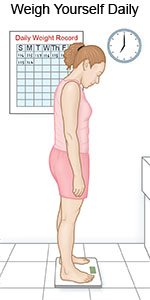Short Bowel Syndrome
Medically reviewed by Drugs.com. Last updated on Apr 6, 2025.
Short bowel syndrome is a condition that prevents your intestines from absorbing the nutrients it needs. Short bowel syndrome occurs when the intestine is shorter than normal or does not work the way it should.
 |
DISCHARGE INSTRUCTIONS:
Seek care immediately if:
- You have severe abdominal pain.
- Your bowel movements are dark or have blood in them.
- You are lightheaded and feel like you are going to faint.
Call your doctor if:
- You have a fever.
- You feel achy, or have chills, weakness, or a cough.
- Your abdominal pain does not go away, even after treatment.
- You have questions or concerns about your condition or care.
Medicines:
You may need any of the following:
- Antibiotics help treat or prevent a bacterial infection.
- Diarrhea medicine decreases the amount of diarrhea you are having.
- Antacids help decrease stomach acid.
- Medicines to treat pain, swelling, or fever may be given. These can cause serious problems if you have liver or kidney disease or a history of bleeding in your stomach. Tell healthcare providers if you have any of these medical conditions before you receive the medicine.
- Vitamin and mineral supplements may be needed because your intestines cannot absorb these nutrients from food.
- Take your medicine as directed. Contact your healthcare provider if you think your medicine is not helping or if you have side effects. Tell your provider if you are allergic to any medicine. Keep a list of the medicines, vitamins, and herbs you take. Include the amounts, and when and why you take them. Bring the list or the pill bottles to follow-up visits. Carry your medicine list with you in case of an emergency.
Treatment options
The following list of medications are related to or used in the treatment of this condition.
Nutrition
may depend on the cause of your short bowel syndrome or how much bowel is left. You may need to meet with a dietitian to talk about the best foods for you.
Weigh yourself daily before breakfast:
Record your weight in a journal. Healthcare providers may need to compare your weight from day to day. This helps them determine the amount of body fluid you have. If you lose too much body fluid, you can become dehydrated. If you have too much body fluid, you may have trouble breathing. Ask what your weight should be.
 |
Follow up with your doctor or gastroenterologist as directed:
Write down your questions so you remember to ask them during your visits.
© Copyright Merative 2025 Information is for End User's use only and may not be sold, redistributed or otherwise used for commercial purposes.
The above information is an educational aid only. It is not intended as medical advice for individual conditions or treatments. Talk to your doctor, nurse or pharmacist before following any medical regimen to see if it is safe and effective for you.
Learn more about Short Bowel Syndrome
Treatment options
Care guides
Medicine.com guides (external)
Further information
Always consult your healthcare provider to ensure the information displayed on this page applies to your personal circumstances.
